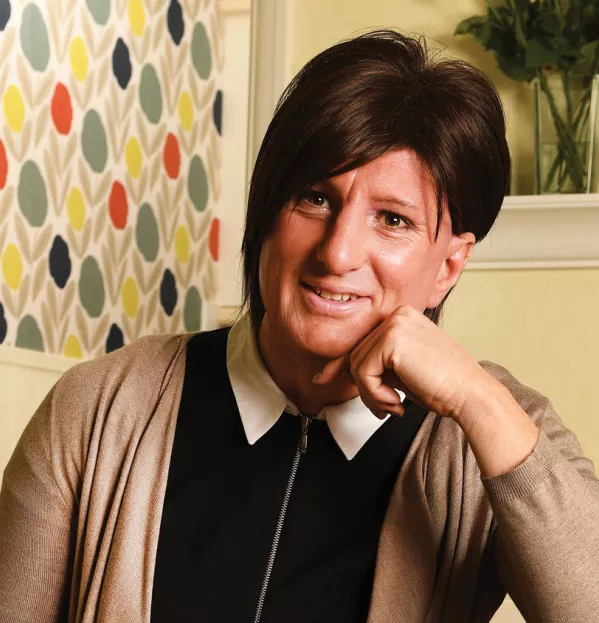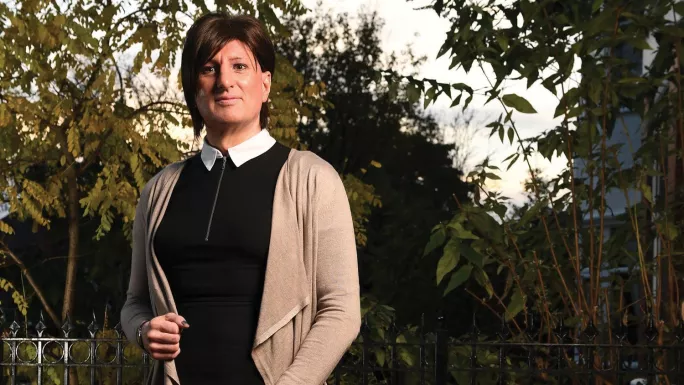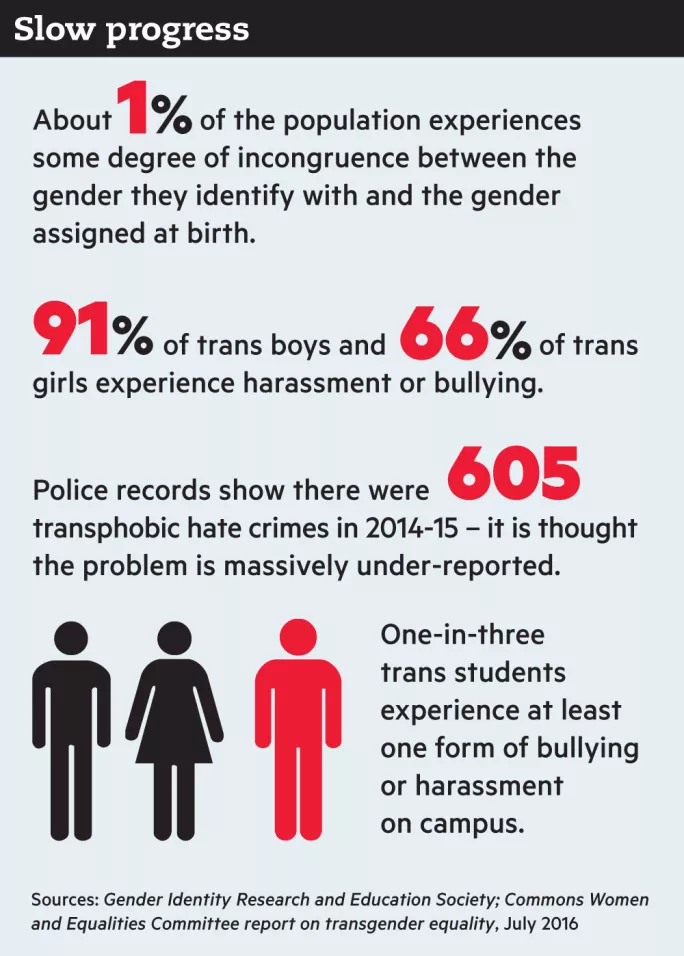Transgender head offers ‘one big public thank you’

Claire Birkenshaw returned to work this week as principal of Ashwell Academy in Hull after six months’ absence.
For that first morning back, she wore a smart Next dress, blazer and knee-high boots - a sensible, uncontroversial look for a middle-aged professional woman. But the last time that students at the alternative-provision academy had seen Ms Birkenshaw, she was wearing a suit - and her name was Michael.
Ms Birkenshaw believes she is the only serving headteacher to transition from male to female while in post. “Straight away, one kid was, ‘Hi Miss’,” she recalls. “It was brilliant; there were no sniggers, it was just superb. It was a really nice morning.”
Now, she just wants to get on with the job, but she has also decided to systematically thank those who have made it possible for her to do just that, including staff and students.
Ministers ‘fantastic’ response
She even emailed Justine Greening, the education secretary and minister for women and equalities, to thank her for the “significant guidance and legislation” from government that has made it possible for her to transition. It was “absolutely fantastic”, replied Ms Greening, adding that Ms Birkenshaw’s openness about her gender identity was “going to make a difference to so many people”. Receiving that letter was, Ms Birkenshaw says, “completely and utterly uplifting”.
The transition has been a long process. Ms Birkenshaw told her chair of governors in September 2015 that she had gender dysphoria and was going to live as a woman. She then started hormone-replacement therapy. But she points out that it took her whole life - 48 years - to get to that point.
She expects the entire process to take a further two-to-three years. During that time, Ms Birkenshaw is taking it day by day; each time she meets someone new, she expects a reaction. So far, they have been positive.
Her privacy has been respected in Hull, the city she describes as a “very big, supportive village”. She informed other headteachers in the local authority a few months ago.
Pupils and staff at her school have been trained in trans awareness to prepare for her return, and parents were informed in July. A press release was prepared in case the media came knocking. It was not needed.

Although Ms Birkenshaw has been supported by family, friends and colleagues, hers is not an easy path. She is deeply aware of the harassment and hate that other transgender people have suffered.
High-profile cases, such as that of Lucy Meadows, a transgender teacher, who killed herself in 2013 after receiving negative press attention, show there is still a long way to go before trans people are universally accepted.
Ms Birkenshaw, born and raised in Bury, has felt “different, female” since she was about four years old. She went through puberty and became head boy at secondary school, at which point she felt “trapped” in masculine identity. At 16, she had a girlfriend, who was the first person she told about her feelings - and who was accepting of them.
“It was an age where there was little knowledge about transgender,” she recalls.
“You got these ‘outings’ of people; the puberty resulted in the fact that I looked like a man and it just seemed that it would be impossible to transition.”
‘I think what people find really difficult to understand is that the essence of me has never, ever changed’
She was, she explains, paralysed by fear: the fear of being shunned or ridiculed and a fear of upsetting her family, who were proud of her success at school.
“Therefore, you can’t do anything about it,” she says. “So you try to suppress how you feel; you use life as white noise to block out those inner feelings. It was a struggle.”
At Hull University, she studied geography before doing a PGCE. Despite her personal struggle, Ms Birkenshaw’s career progressed from teacher to head of department, to deputy head and then headteacher.
“I suppose I was waiting for society to catch up,” she says, “in terms of the legal framework and the medical procedures.”
Ms Birkenshaw got to the stage that she felt her condition was “consuming” her - and then something helped her: other people’s stories. She received “hope and inspiration” from Stephanie Hirst, a radio presenter in Yorkshire, who transitioned in 2014.

Becoming a role model
Ms Birkenshaw recognises that working with children puts transgender teachers in a different, perhaps more exposed, position from a radio presenter. She could keep quiet - she has “utter respect” for trans people who decide that this is the best way for them. But she feels that now she is living and working as a woman, there is an opportunity to do more - to become a role model to transgender students and teachers.
“If I look at education, it doesn’t seem to be that [there are] many role models,” says Ms Birkenshaw. “So I can try to do things under the radar… but how are people going to know?
“These children in schools need someone who is out there. Stephanie macheted the way for me. I’m hoping to machete the way for somebody else, and then the next person comes along and the next person, and hopefully in future they will only need tweezers.”
Ms Birkenshaw lived for 48 years worrying that being true to herself would upset others. Now, she has decided that people’s reactions are their own problem. Part of that shift is to point out that, yes, transitioning is a big deal, but not everything about her has transformed.
“I think what people find really difficult to understand is that the essence of me has never, ever changed,” she says. “As one of my friends said, ‘Well, do you still support Man Utd?’ I said, ‘Well, everybody knows you can change your sex, but you can never change your football team.’”
‘Acts of positivity’
For Ms Birkenshaw, approaching and telling her story to TES was about celebrating the growing tolerance in society that has allowed her to successfully return to work as a transgender headteacher - and doing her bit for the next generation.
It is, she says, “one big public thank you”.
“At the moment, the zeitgeist is around intolerance,” she explains. “There seems to be a lot of anger about at the moment. As an educationalist, we’re shaping children’s lives for the future and there is an alternative viewpoint. Saying thank you. Doing those acts of kindness. Sometimes society doesn’t need to change by big changes, it needs those little acts of positivity.”
Now that she has spoken publicly about her transgender status, what are her hopes for the future? “I still expect to be a headteacher,” she says. “I still expect to be working with schools, with academies and ensuring that children are making progress - but also that children are happy.”
You need a Tes subscription to read this article
Subscribe now to read this article and get other subscriber-only content:
- Unlimited access to all Tes magazine content
- Exclusive subscriber-only stories
- Award-winning email newsletters
Already a subscriber? Log in
You need a subscription to read this article
Subscribe now to read this article and get other subscriber-only content, including:
- Unlimited access to all Tes magazine content
- Exclusive subscriber-only stories
- Award-winning email newsletters